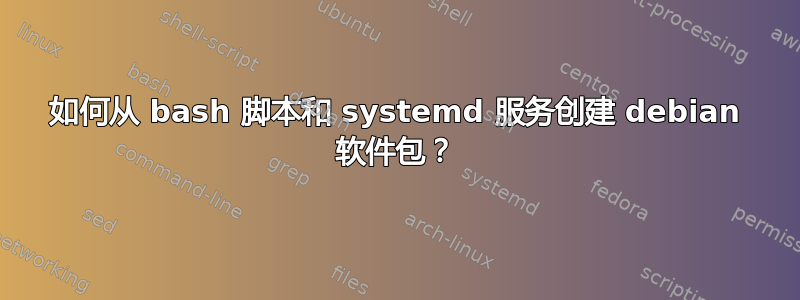
如何从 bash 脚本和 systemd 服务构建 debian 软件包?
.deb安装成功后,systemd 服务将通过启动/停止来控制脚本以供使用。从网络搜索中,有一些简单的示例可以将单个文件(python、shell、ruby ...脚本)转换为.deb.
答案1
这是一个最小的源包,它将安装 shell 脚本和相关服务。
树如下:
minpackage
├── debian
│ ├── changelog
│ ├── control
│ ├── install
│ ├── minpackage.service
│ ├── rules
│ └── source
│ └── format
└── script
script是你的脚本,权限为755;debian/minpackage.service是你的服务。
debian/changelog需要看起来像
minpackage (1.0) unstable; urgency=medium
* Initial release.
-- GAD3R <[email protected]> Tue, 05 Jan 2021 21:08:35 +0100
debian/control应包含
Source: minpackage
Section: admin
Priority: optional
Maintainer: GAD3R <[email protected]>
Build-Depends: debhelper-compat (= 13)
Standards-Version: 4.5.1
Rules-Requires-Root: no
Package: minpackage
Architecture: all
Depends: ${misc:Depends}
Description: My super package
debian/rules应包含
#!/usr/bin/make -f
%:
dh $@
(Tab之前有一个真实的dh)。
其余文件可以按如下方式创建:
mkdir -p debian/source
echo "3.0 (native)" > debian/source/format
echo script usr/bin > debian/install
要构建包,请运行
dpkg-buildpackage -uc -us
在minpackage目录中。
这将minpackage_1.0_all.deb在父目录中创建。它还将为您处理 systemd 维护者脚本,因此该服务将在安装软件包时自动启用,并支持 Debian 中可用的各种覆盖机制。
答案2
假设您想要部署myservice.service并且myscript想要一个像这样的树结构:
$ tree
.
├── DEBIAN
│ ├── control
│ ├── postinst
│ ├── postrm
│ └── prerm
├── lib
│ └── systemd
│ └── system
│ └── myservice.service
└── usr
└── bin
└── myscript
./DEBIAN/应包含控制文件用于元数据和部署的维护者脚本。
这是一个基本的控制文件:
Package: mypackage
Version: 0.1
Architecture: all
Maintainer: GAD3R <[email protected]>
Description: This is my package!
dh_installsystemd(1)通常用于将默认代码添加到维护者脚本中以管理服务。你的可能看起来像这样:
后置:
#!/bin/sh
set -e
# Automatically added by dh_installsystemd/13.2
if [ "$1" = "configure" ] || [ "$1" = "abort-upgrade" ] || [ "$1" = "abort-deconfigure" ] || [ "$1" = "abort-remove" ] ; then
# This will only remove masks created by d-s-h on package removal.
deb-systemd-helper unmask 'myservice.service' >/dev/null || true
# was-enabled defaults to true, so new installations run enable.
if deb-systemd-helper --quiet was-enabled 'myservice.service'; then
# Enables the unit on first installation, creates new
# symlinks on upgrades if the unit file has changed.
deb-systemd-helper enable 'myservice.service' >/dev/null || true
else
# Update the statefile to add new symlinks (if any), which need to be
# cleaned up on purge. Also remove old symlinks.
deb-systemd-helper update-state 'myservice.service' >/dev/null || true
fi
fi
# End automatically added section
# Automatically added by dh_installsystemd/13.2
if [ "$1" = "configure" ] || [ "$1" = "abort-upgrade" ] || [ "$1" = "abort-deconfigure" ] || [ "$1" = "abort-remove" ] ; then
if [ -d /run/systemd/system ]; then
systemctl --system daemon-reload >/dev/null || true
if [ -n "$2" ]; then
_dh_action=restart
else
_dh_action=start
fi
deb-systemd-invoke $_dh_action 'myservice.service' >/dev/null || true
fi
fi
# End automatically added section
后期:
#!/bin/sh
set -e
# Automatically added by dh_installsystemd/13.2
if [ -d /run/systemd/system ]; then
systemctl --system daemon-reload >/dev/null || true
fi
# End automatically added section
# Automatically added by dh_installsystemd/13.2
if [ "$1" = "remove" ]; then
if [ -x "/usr/bin/deb-systemd-helper" ]; then
deb-systemd-helper mask 'myservice.service' >/dev/null || true
fi
fi
if [ "$1" = "purge" ]; then
if [ -x "/usr/bin/deb-systemd-helper" ]; then
deb-systemd-helper purge 'myservice.service' >/dev/null || true
deb-systemd-helper unmask 'myservice.service' >/dev/null || true
fi
fi
# End automatically added section
预审:
#!/bin/sh
set -e
# Automatically added by dh_installsystemd/13.2
if [ -d /run/systemd/system ] && [ "$1" = remove ]; then
deb-systemd-invoke stop 'myservice.service' >/dev/null || true
fi
# End automatically added section
然后将它们放在一起:
dpkg-deb -b . mypackage.deb


